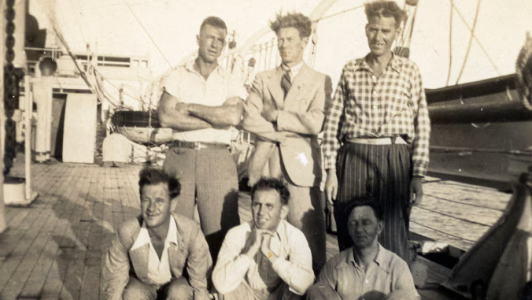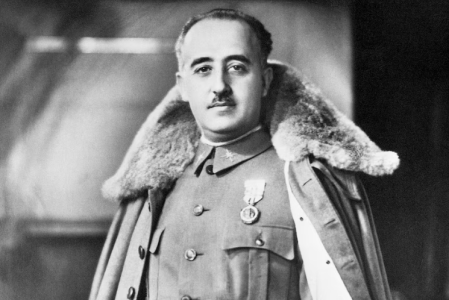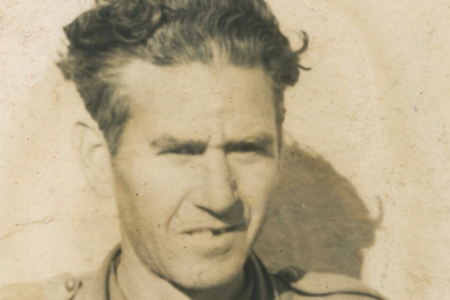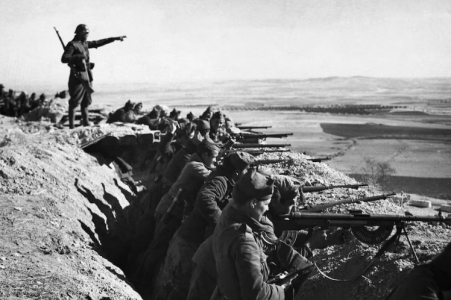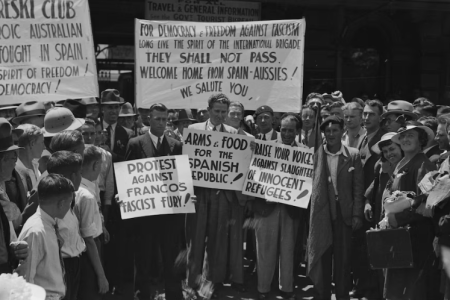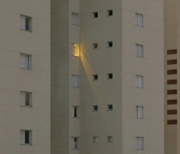The Australians who fought General Franco and his forces in the Spanish Civil War
By
ABC News
- Replies 0
In 1936, as Spain descended into a bloody civil war, the left-wing Republican side put out an international call for help.
They were fighting against the right-wing Nationalists, who were led by the country's dictator-to-be General Francisco Franco.
Thousands of people travelled to Spain to join the fight as part of the International Brigades, including the likes of British writer George Orwell.
Among the less high-profile recruits was a small band of Australian men and women, who left their lives in Australia for what they saw from afar as a great ideological battle.
Australia has a long and complicated history of foreign fighters, including most recently people travelling to Ukraine. But, as their admirers boast, the Australians of the International Brigades can claim a significant title.
"They were the first Australians to fight fascism," Michael Samaras, author of Anti-Fascists: Jim McNeill and his Mates in the Spanish Civil War, tells ABC Radio National's Late Night Live.
'They weren't allowed to go'
The 1930s was a tumultuous decade for Spain.
The country's monarchy collapsed and there was a shift to democracy. But with this, social and political tensions flared. It culminated in Franco's military coup against the democratically elected government, which kickstarted the civil war.
The right-wing Nationalists received aid and troops from Fascist Italy and Nazi Germany, while the left-wing Republicans were assisted by the Soviet Union and the volunteers of the International Brigades.
Samaras says that about 65 to 70 Australian men and women joined the International Brigades or other parts of the Republican side. But they did so in an unofficial and often clandestine way.
"They went against what the government of the day was doing … They weren't allowed to go," Samaras says.
"Australia's government in the 1930s was a government of appeasement. We were following Britain's policy to appease the dictators in Europe. With the Spanish Civil War, we followed a policy of non-intervention."
This meant the difficulties for these Australians started long before the battlefield.
"They went under false names. They went illegally. They stowed away [on ships]," Samaras explains.
Half a world away
Among the Australians who travelled to Spain was Wollongong steelworker and outspoken communist Jim McNeill.
McNeill was a prominent "Wobbly" in the 1920s — that is, a member of the Industrial Workers of the World, a radical, international working-class organisation. He later joined the Communist Party of Australia.
As in other countries at the time, Australian leftist groups clashed — sometimes violently — with right-wing groups like the New Guard, which was the largest fascist organisation in Australia's history.
"[McNeill] was very much at the forefront of fighting the New Guard," Samaras says. And this included actual fights, with McNeill reportedly shot at in one clash between the groups in the Sydney suburb of Drummoyne.
After the Spanish Civil War broke out in July 1936, McNeill was determined to heed the call.
He later said he made this choice after his experiences with the "vicious" New Guard in Australia, and that Spain "was the first place to organise against the fascists or Nazis, Mussolini or Hitler".
But McNeill didn't have the money to get to Spain, so he stowed away on a ship from Melbourne to England.
McNeill then travelled to France and trekked across the Pyrenees mountains into Spain where he joined, trained with and then fought for the International Brigades.
The Australian fought in the Battle of the Ebro, the longest and largest battle of the Spanish war. He got injured, went missing and was presumed dead. But McNeill survived the war and returned home to Wollongong.
Australian men like McNeill either joined as troops or worked in logistical roles, while women served as nurses, doctors, translators and in administrative support.
Samaras says around 16 Australians were killed in action including Ted Dickinson, a close friend of Jim McNeill and fellow political firebrand.
Dickinson fought in the Battle of Jarama, where he was captured and then executed by Franco's forces.
According to a fellow soldier, among his final words he reputedly said: "If I had a bunch of Australian bushmen here, we'd have pushed you bastards into the sea long ago".
Samaras says the band of Australians who shipped off to Spain were broadly leftists, mostly communist, and every last one was deeply opposed to the global spread of fascism.
"They were our first pioneers against fascism, the first Australians to stand up and take up arms, to put their lives on the line."
Fighting for Franco
The world was far more disconnected in the 1930s, meaning most Australians didn't follow the specifics of the Spanish Civil War. Instead they were concerned with things like "paying the rent, football and racing", Samaras says.
"But people who did care, cared deeply."
On the Republican side were the likes of McNeill, the Communist Party, trade unions, and some within the Labor Party. On the Nationalist side, it was mainly people involved with the Catholic Church, as the new democratic Spain had been taking steps to diminish the power of the Catholic Church there.
Only one Australian was known to have fought for Franco and the Nationalist forces.
His name was Nugent Bull.
"He was a Catholic … His family were undertakers in [Sydney's] Newtown. He did the books at Luna Park," Samaras says.
After the end of the Spanish Civil War, Bull went to England. And in an "astonishing, ironic turn of events", he joined the UK's Royal Air Force as an air gunner and was killed in the Battle of Britain.
"So he was fighting for the fascists in Spain, and then against the fascists in World War II," Samaras says.
The end of the war and aftermath
General Franco and the Nationalist forces won the Spanish Civil War, which came to an end in early 1939. The violence and atrocities from both sides had left at least 500,000 people dead.
"Both sides did terrible things. It was a terrible war," Samaras says.
"[But] the killing didn't stop with the end of the war. Franco was not about reconciliation. He was about extermination. He wanted to get rid of his enemies … he kept imprisoning and killing people up until his own death in 1975."
During the Cold War years, communists and other leftists were viewed with great suspicion in Australia, which did not help with the legacy of the International Brigades.
"They became a victim of the Cold War," Samaras says.
There are two unofficial memorials for Australians who fought in the Spanish Civil War — one in Melbourne's Trades Hall and one in Canberra's Lennox Gardens. But Samaras laments that there has been no official recognition by the federal government or the Australian War Memorial.
ABC Radio National contacted the Australian War Memorial about the Australians who fought in the Spanish Civil War.
"The Australian War Memorial Act 1980 determines that the Memorial commemorates Australians who have died on or as a result of 'active service in war or in warlike operations by members of the Defence Force'," a statement said.
"As the Australians who fought in the Spanish Civil War were not members of the Australian armed forces, they fall outside the legislated remit of the Australian War Memorial."
The statement added that its collection does include items from the Spanish Civil War.
But Samaras is continuing his fight for recognition.
"History proved [these Australians] right very quickly," he says, as the end of the Spanish Civil War was soon followed by the start of World War II, when Australia went to war against Nazi Germany, and then Fascist Italy.
"So the people who got in first should be respected and admired," Samaras says.
"The Australian government has never done anything for them … They've never been honoured officially."
Written by Nick Baker and Gail Boserio, ABC News.
They were fighting against the right-wing Nationalists, who were led by the country's dictator-to-be General Francisco Franco.
Thousands of people travelled to Spain to join the fight as part of the International Brigades, including the likes of British writer George Orwell.
Among the less high-profile recruits was a small band of Australian men and women, who left their lives in Australia for what they saw from afar as a great ideological battle.
Australia has a long and complicated history of foreign fighters, including most recently people travelling to Ukraine. But, as their admirers boast, the Australians of the International Brigades can claim a significant title.
"They were the first Australians to fight fascism," Michael Samaras, author of Anti-Fascists: Jim McNeill and his Mates in the Spanish Civil War, tells ABC Radio National's Late Night Live.
'They weren't allowed to go'
The 1930s was a tumultuous decade for Spain.
The country's monarchy collapsed and there was a shift to democracy. But with this, social and political tensions flared. It culminated in Franco's military coup against the democratically elected government, which kickstarted the civil war.
The right-wing Nationalists received aid and troops from Fascist Italy and Nazi Germany, while the left-wing Republicans were assisted by the Soviet Union and the volunteers of the International Brigades.
Samaras says that about 65 to 70 Australian men and women joined the International Brigades or other parts of the Republican side. But they did so in an unofficial and often clandestine way.
"They went against what the government of the day was doing … They weren't allowed to go," Samaras says.
"Australia's government in the 1930s was a government of appeasement. We were following Britain's policy to appease the dictators in Europe. With the Spanish Civil War, we followed a policy of non-intervention."
This meant the difficulties for these Australians started long before the battlefield.
"They went under false names. They went illegally. They stowed away [on ships]," Samaras explains.
Among the Australians who travelled to Spain was Wollongong steelworker and outspoken communist Jim McNeill.
McNeill was a prominent "Wobbly" in the 1920s — that is, a member of the Industrial Workers of the World, a radical, international working-class organisation. He later joined the Communist Party of Australia.
As in other countries at the time, Australian leftist groups clashed — sometimes violently — with right-wing groups like the New Guard, which was the largest fascist organisation in Australia's history.
"[McNeill] was very much at the forefront of fighting the New Guard," Samaras says. And this included actual fights, with McNeill reportedly shot at in one clash between the groups in the Sydney suburb of Drummoyne.
After the Spanish Civil War broke out in July 1936, McNeill was determined to heed the call.
He later said he made this choice after his experiences with the "vicious" New Guard in Australia, and that Spain "was the first place to organise against the fascists or Nazis, Mussolini or Hitler".
But McNeill didn't have the money to get to Spain, so he stowed away on a ship from Melbourne to England.
McNeill then travelled to France and trekked across the Pyrenees mountains into Spain where he joined, trained with and then fought for the International Brigades.
The Australian fought in the Battle of the Ebro, the longest and largest battle of the Spanish war. He got injured, went missing and was presumed dead. But McNeill survived the war and returned home to Wollongong.
Australian men like McNeill either joined as troops or worked in logistical roles, while women served as nurses, doctors, translators and in administrative support.
Samaras says around 16 Australians were killed in action including Ted Dickinson, a close friend of Jim McNeill and fellow political firebrand.
Dickinson fought in the Battle of Jarama, where he was captured and then executed by Franco's forces.
According to a fellow soldier, among his final words he reputedly said: "If I had a bunch of Australian bushmen here, we'd have pushed you bastards into the sea long ago".
Samaras says the band of Australians who shipped off to Spain were broadly leftists, mostly communist, and every last one was deeply opposed to the global spread of fascism.
"They were our first pioneers against fascism, the first Australians to stand up and take up arms, to put their lives on the line."
Fighting for Franco
The world was far more disconnected in the 1930s, meaning most Australians didn't follow the specifics of the Spanish Civil War. Instead they were concerned with things like "paying the rent, football and racing", Samaras says.
"But people who did care, cared deeply."
On the Republican side were the likes of McNeill, the Communist Party, trade unions, and some within the Labor Party. On the Nationalist side, it was mainly people involved with the Catholic Church, as the new democratic Spain had been taking steps to diminish the power of the Catholic Church there.
Only one Australian was known to have fought for Franco and the Nationalist forces.
His name was Nugent Bull.
"He was a Catholic … His family were undertakers in [Sydney's] Newtown. He did the books at Luna Park," Samaras says.
After the end of the Spanish Civil War, Bull went to England. And in an "astonishing, ironic turn of events", he joined the UK's Royal Air Force as an air gunner and was killed in the Battle of Britain.
"So he was fighting for the fascists in Spain, and then against the fascists in World War II," Samaras says.
General Franco and the Nationalist forces won the Spanish Civil War, which came to an end in early 1939. The violence and atrocities from both sides had left at least 500,000 people dead.
"Both sides did terrible things. It was a terrible war," Samaras says.
"[But] the killing didn't stop with the end of the war. Franco was not about reconciliation. He was about extermination. He wanted to get rid of his enemies … he kept imprisoning and killing people up until his own death in 1975."
During the Cold War years, communists and other leftists were viewed with great suspicion in Australia, which did not help with the legacy of the International Brigades.
"They became a victim of the Cold War," Samaras says.
There are two unofficial memorials for Australians who fought in the Spanish Civil War — one in Melbourne's Trades Hall and one in Canberra's Lennox Gardens. But Samaras laments that there has been no official recognition by the federal government or the Australian War Memorial.
ABC Radio National contacted the Australian War Memorial about the Australians who fought in the Spanish Civil War.
"The Australian War Memorial Act 1980 determines that the Memorial commemorates Australians who have died on or as a result of 'active service in war or in warlike operations by members of the Defence Force'," a statement said.
"As the Australians who fought in the Spanish Civil War were not members of the Australian armed forces, they fall outside the legislated remit of the Australian War Memorial."
The statement added that its collection does include items from the Spanish Civil War.
But Samaras is continuing his fight for recognition.
"History proved [these Australians] right very quickly," he says, as the end of the Spanish Civil War was soon followed by the start of World War II, when Australia went to war against Nazi Germany, and then Fascist Italy.
"So the people who got in first should be respected and admired," Samaras says.
"The Australian government has never done anything for them … They've never been honoured officially."
Written by Nick Baker and Gail Boserio, ABC News.

